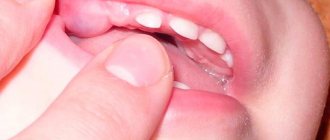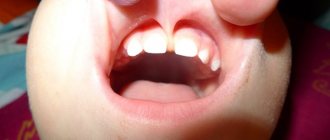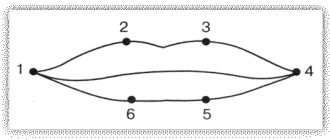Modern man has a big problem - we don’t know how to eat. Adults do not have enough time to eat normally at a calm pace, and in most cases children are not even taught to chew. Many parents specifically feed their babies soft or pureed food. Everyone is afraid that the child will be capricious or choke. Let's figure it out - what is the mistake of this approach and why is chewing so important?
Typically, people literally swallow their food and quickly wash it down with a hot or sweet liquid, and that's the end of the meal. Among the consequences: digestive problems and regular overeating, since the body requires much more energy to digest poorly chewed food.
The process of digesting food begins in the oral cavity. Saliva is secreted in the mouth, which contains enzymes and breaks down easily soluble substances and softens denser ones. The teeth and tongue grind and crush food. By the time the food gets into the stomach, it will be much easier to digest and assimilate it than if you simply swallow the product (otherwise it will ferment, which will negatively affect the functioning of the gastrointestinal tract).
As shown by Chinese and American studies published in The American Journal of Clinical Nutrition, experiment participants consumed 11.9% fewer calories, regardless of their size, their bodies became full faster, they felt less hungry, and they even managed to lose a little weight.
Not united by food
Chewing not only ensures a normal digestive process, but also has a number of other benefits. If you start teaching your baby to chew in time (from 6-7 months), his bite will form. Moreover, as shown by a Belgian study published in the journal J Voice, chewing promotes proper speech development. When a child chews, bites or licks, his lips, tongue, cheeks and jaws work. This develops the same motor skills as when speaking. In practice, it turns out that the process of eating food is the most enjoyable type of articulatory gymnastics.
Pediatrician of the highest category Yulia Viktorovna Andronnikova told us about other functions of chewing:
- Chewing slowly allows you to feel full with less food, as the signal has time to reach the centers regulating hunger and appetite.
- Chewing movements activate areas of the cerebral cortex that are responsible for cognitive abilities. In children, chewing stimulates development. If this process is disrupted, dementia can progress in old age.
- Chewing movements form the facial skeleton, which is very important for proper breathing and blood supply to the central nervous system.
- Not a single cosmetic procedure will help keep you in good shape and improve blood supply to the facial muscles as well as proper (slow) chewing.
Why does a child chew his tongue?
Home / Articles / Parents / Care and development
July 30, 2014 |
Sometimes parents of babies who are not even six months old notice a strange thing - the child is chewing his tongue. But this happens not only at this age, some children can do this at one or even two years old. It is not surprising that mothers panic; they think that this is due to problems with the baby’s nervous system. However, this is not always the case, and there are many reasons for tongue chewing.
Why does a child chew his tongue? Causes
One of the main reasons why a child chews his tongue is to prepare the baby for chewing adult food. Usually by 4-5 months, children begin to drool. Many mothers associate this with the first teeth, but the active work of the salivary glands may also be due to the fact that the baby will soon need to process more solid food.
Another reason may be the child's hunger. If it's feeding time, your baby may chew his tongue instead of the food he craves. It is clear that there is nothing special about this. Time will pass when the baby learns to ask for food and stops chewing his tongue.
Children who are weaned off the pacifier early or are not allowed to suck their thumbs by wrapping the baby in a diaper or putting anti-scratch pads on their arms often chew their tongues. A child, accustomed to having something in his mouth all the time, begins to suck or chew his tongue.
Another very good reason for a child’s tongue sucking is rapid teething. Many children refuse to use a teether and prefer thumb sucking or tongue chewing. Even if the baby’s first incisors have already appeared, and he continues to chew his tongue, do not worry, because there will be many more teeth ahead.
Sometimes a child chews his tongue when he is thinking intently about something or is very busy with something. Watch your baby as he enthusiastically plays with himself. The baby can chew its tongue, suck it and even stick it out. There is nothing special about this, because even adults, when they are immersed in thoughts or busy with something, can do things that are even unusual for him - winding his hair around his fingers, biting his lower lip, etc.
Children often chew their tongue when they are bored. This usually applies to babies who have already crossed the one-year mark. Lack of attention from adults often leads to the fact that children, trying to occupy themselves with something, acquire different habits - biting their nails, picking their noses, etc.
As you can see, there are many reasons why a child chews his tongue. And in most cases, the problem goes away on its own over time. But, if you notice that your baby chews his tongue without ceasing, that is, obsessively and for quite a long time, contact a neurologist to be sure to dispel all doubts.
How to stop a child from chewing his tongue?
So, we figured out the reasons. And as you can see, there is nothing terrible to worry about. However, a habit is a habit, and it can stay with a person for a long time. Therefore, it is still worth trying to wean your child from this simple activity.
Firstly, you need to distract the baby from chewing his tongue, for example, give him a pacifier. If your child does not suck on a pacifier, give him a toy that he will happily put into his mouth and chew better than his tongue. Secondly, let the child understand that this cannot be done. When your child chews his tongue, lightly touch his lips and say “No!” Even a six-month-old child will understand that he is doing something wrong.
Try to accustom your child to the pacifier; after all, a pacifier is better than fingers in the mouth, and even more so, chewing the tongue. There is no need to wean off a pacifier early, especially if the child does not want to wean himself off it. If you take the pacifier by force, don't be surprised if the baby sucks and chews its tongue.
Do not swaddle your baby after three months. Usually from this age, and sometimes earlier, children begin to study their hands and taste them. Let the kids develop as they should.
If the child is already older - a year, a year and a half, but continues to chew his tongue, then just tell him that it is ugly to do this. At this age, children already understand many things very well. In general, try to pay more attention to your baby. The more you communicate and play with your baby, the less time he will have for various bad habits.
Did you like the article? Share with friends:
Leave your comment: Cancel
When and how to teach a child
To prepare your child for chewing, you can make faces, grimace, and perform chewing movements. When your baby “speaks baby,” answer him. The child will repeat after you and actively move his jaws, tongue and lips.
The sooner parents introduce their child to foods of different hardness, the more willing he will be to try new foods. As soon as the child began to make chewing movements, slurping and smacking, he developed an interest in food, and especially when the first teeth appear, you can give pieces of food (soft boiled vegetables, for example, carrots). The optimal age for the first introduction to food is 6-7 months. Children are old enough to accept new food, but still too young to start being capricious and indignant at the table.
Promote jaw muscle development
Many of the muscles that a child uses when speaking are also involved in chewing. Around eight months, babies begin to babble. Encourage these first attempts to speak - respond to the child’s “cues” and make funny faces so that the child repeats after you (thereby training the jaw muscles).
Pay attention to the child's decreased gag reflex
Every child is born with a gag reflex, which helps him use his tongue to push foreign objects out of his mouth and protects him from suffocation. By about six months, this reflex weakens, which means the baby is ready to learn to chew. This reflex does not go away immediately, and at first, when the child learns to chew, the reflex will manifest itself (the child chokes and spits out food). The worst thing you can do at this stage is get overexcited and go back to liquid purees. You need to calm down and, under close supervision, continue to give your child food with pieces, food that he can pick up with his hands and try to chew. The more practice he has, the better he will learn to control his gag reflex.
What food encourages your baby to chew?
About three weeks after your baby starts eating purees, he needs to be gradually introduced to chewable foods to develop this skill. First you need to offer him a thicker puree. Later, you can add well-cooked rice or slices of banana or apple instead of grinding them in a blender. Also offer him food that he can pick up and chew. Your child will likely be unlikely to bite into a piece of bread or cucumber at first, but continue to offer him firm, but easy-to-chew pieces of food that he can pick up on his own. Over time, the jaw muscles will become stronger and the baby will start teething, making chewing easier. Remember not to give too hard food. It should be of such a consistency that the child can knead it with his tongue. If you add pieces of food to purees, add one type of food to one dish so that your baby experiences one texture rather than several. This will make it easier for him to understand how to chew.
Types of food
There are eight factors that can help you determine how easy or difficult it is for your child to chew a particular food:
- the amount of pressure a baby uses to bite through food
- sensory perception (such as temperature and seasonality of food)
- size (thinner pieces are easier to chew than thick ones)
- shape (food cut into narrow strips will be easier to chew than if it is thick strips)
- soft texture that kneads easily in the mouth
- consistency (food with a uniform consistency, for example, a banana, is easier to chew than with a heterogeneous consistency, for example, an unpeeled cucumber)
- part of the mouth with which the child bites and chews (lateral, middle, front)
- the number of chewing movements required to soften a particular food for swallowing.
When choosing foods for your baby who is starting to learn to chew, start with the easiest ones for him, such as strips of boiled carrots - they are narrow and thin, do not require much effort to bite and chew, and soften quickly in the mouth. Once he can handle these types of foods, you can move on to more challenging ones, such as fresh fruits and vegetables, meat and cookies.
What indicates that there is a problem: the child does not chew
Some children have an overly sensitive gag reflex (usually children with reflux). Such children take longer to learn to chew and swallow food. Many mothers notice that it is easier for children to eat if they themselves take food with their hands, rather than when they are fed from a spoon. This is how they control the situation. Most babies outgrow their overly sensitive gag reflex by twelve months; Therefore, if a year old child does not chew or cannot chew pieces and food that he can pick up, consult a doctor.
Underwater rocks
Up to six months, children have an active expulsion reflex - a natural defense against suffocation. Therefore, at the beginning of “communication” with semi-solid food, the child may choke and spit out the food. There is no need to be scared and abruptly return to purees and ground products! Chewing is a skill and needs to be learned.
If you've introduced semi-solid foods a long time ago and your baby is still choking, give him time. Place food in front of your baby and watch - let him try to put food in his mouth with his hand on his own. Children should be praised and not scolded at the table! Otherwise, food may begin to be associated with violence and lead to an eating disorder.
Links:
- The American Journal of Clinical Nutrition, Volume 94, Issue 3, September 2011, Pages 709–716, https://doi.org/10.3945/ajcn.111.015164
- The American Journal of Clinical Nutrition. Mastication of almonds: effects of lipid bioaccessibility, appetite, andhormone response. Bridget A Cassady. https://ucce.ucdavis.edu/files/datastore/608-11.pdf
- Cell. Nicolas Dutzan. Published: January 10, 2022 DOI: https://doi.org/10.1016/j.immuni.2016.12.010
- Effectiveness of Chewing Technique on the Phonation of Female Speech-Language Pathology Students: A Pilot Study. Meerschman I DOI:10.1016/j.jvoice.2015.06.016
There are several reasons why babies may have the habit of sticking out their tongue, ranging from innate reflexes to health problems.
The child sticks out his tongue. This is fine?
Babies typically explore the world using their mouths. Therefore, sticking out the tongue is the norm rather than the exception, and the main reason that encourages a child to do this is an innate reflex. In this case, we are talking about the “tongue push reflex,” which helps the baby grasp the nipple.
Reflexive tongue protruding is a common occurrence and is observed in every healthy child, and the baby outgrows this habit by 5-7 months.
Reasons why a child sticks out his tongue
Below are other common reasons, besides reflexes, why a baby might stick out their tongue.
1. Imitating adults
Many adults often stick out their tongues as a game. Usually the answer is loud laughter! According to a number of studies, infants can copy the behavior of adults by imitating them.
2. Means of expressing needs
The baby may stick out its tongue to signal to mom, “I’m hungry.” True, it happens the other way around: the baby behaves in exactly the same way to communicate: “I’m full. You can stop feeding me.”
3. Manifestation of a gag or sucking reflex
Examples of infant reflexes that can cause a baby to stick out his tongue are sucking and gagging.
The sucking reflex occurs when the area around the mouth is stroked. This movement causes the baby to move his lips and tongue in anticipation of sucking.
The gag reflex occurs when the back of the mouth or throat feels a hard object. By sticking out his tongue, the baby seems to be trying to remove a possible foreign body.
4. Unpreparedness for solid foods
Babies tend to stick out their tongues when spoon-fed semi-solid foods. If a child does this, it means that he still has a gag reflex and is not ready for semi-solids and solids.
Children stop doing this as soon as the tongue can press on the upper part of the palate and swallow food.
5. Mouth breathing
The child may stick his tongue out when breathing through his mouth. The reasons for this can be very different: cough, cold, sinus blockage, allergies, inflammation of the tonsils or adenoids.
6. Discomfort due to gas
Some children may stick out their tongue during gas passage due to discomfort and pain.
7. Macroglossia
Macroglossia is an abnormal enlargement of the tongue such that it is very difficult to hold it in the mouth. Some children may develop this condition due to conditions such as Down syndrome, hypothyroidism, or Beckwith-Wiedemann syndrome.
Sometimes a large tongue can be inherited from parents or be the result of a tumor or injury.
8. Micrognathia
Some babies are born with a small chin and jaw, making it difficult to hold their tongue in such a mouth. This condition is known as micrognathia and for many people it goes away on its own as the mouth grows and muscles develop by 5-7 months of age.
Other causes of micrognathia are cleft palate and underlying diseases such as Marfan disease, trisomy 13, trisomy 18, Pierre Robin syndrome, etc. In this case, the tongue size is normal, but the chin is small.
9. Hypotension
Hypotonia is low muscle tone that can affect several muscles in the body, including the tongue. In such cases, the child's tongue protrudes from the mouth. This can happen due to various diseases such as Down syndrome, Prader-Willi syndrome, Rett syndrome, etc.
10. Abnormal tissue growth in the mouth
Tissues that grow abnormally in the mouth or on the tongue can fill the space so much that the tongue becomes cramped and the child is forced to stick it out.
The reasons why this happens: a tumor or infection of the salivary gland or a thyroid duct cyst.
11. Orofacial-functional disorder
Tongue thrusting is the most common type of orofacial functional disorder (OMD), a group of facial and oral disorders. This often occurs due to abnormal resting position of the tongue.
The disorder can develop due to various reasons, such as congenital problems, family history, and even prolonged thumb sucking.
FAQ
1. Is a baby's tongue sticking out a sign of teething?
When your baby is teething, he may feel irritation in his mouth and instinctively begin to push out his tongue. Look for other accompanying symptoms of baby teeth, such as swollen or red gums, excessive drooling, and irritability.
2. Do children with Down syndrome stick out their tongues?
Yes. Children with Down syndrome have very small jaws and low muscle tone. These factors provoke tongue protrusion. However, such behavior in itself should not be considered a diagnostic characteristic of Down syndrome.
3. Is tongue sticking out a sign of autism?
A protruding tongue is not an independent symptom of autism spectrum disorder. However, it can occur along with various other symptoms in children with autism.










